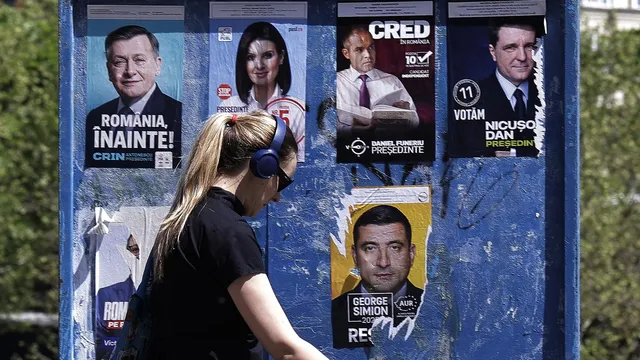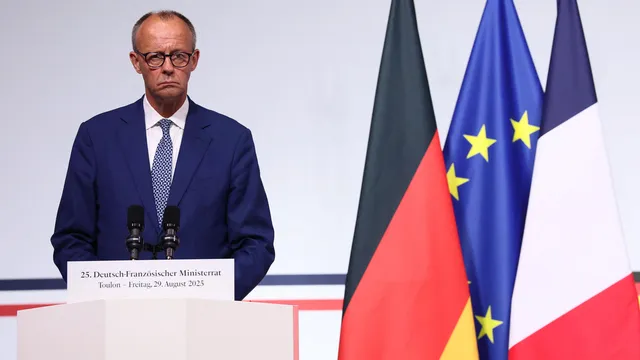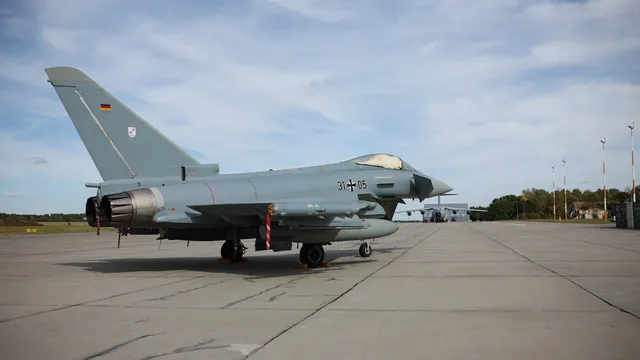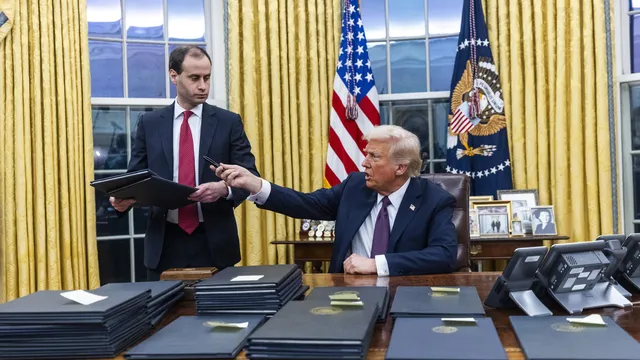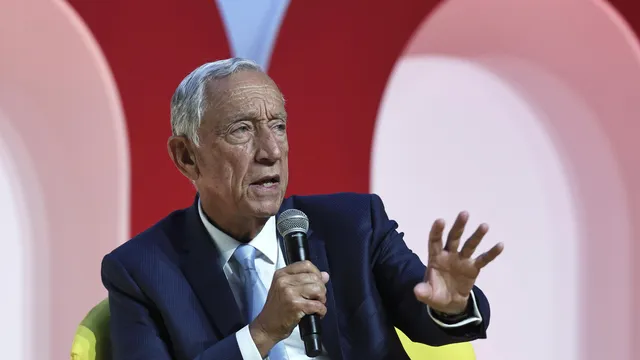All eyes are on Romania. The country goes to the polls on May 4 in the first round of the disputed presidential election, after concerns about Russian interference led to the annulment of the initial vote last November.
Now that Moscow-backed ultranationalist Kalin Giurgescu has been disqualified from the re-run, George Simion, leader of the far-right Alliance for the Union of Romanians (AUC), has climbed to the top of the polls ahead of a vote that threatens to shake up the EU and NATO if Bucharest strays from its pro-European path.
So far, there are four candidates - according to the polls - who appear to have a chance of making it to the critical second round on 18 May: Simion; ruling party candidate Crin Antonescu; independent centrist Nikusor Dan; and leftist nationalist Victor Ponta, each of whom is in second position in separate recent surveys.
Here's what could happen in any of the second-round scenarios between the four men... including options that would leave Brussels watching from the sofa.
Simion vs. Dan
With Georgescu barred from running, Simion presents himself as the candidate of nationalist voters - with apparent success. His 30 percent support in recent polls is roughly equal to the sum of the votes Giurgescu won in November, plus his own.
A self-proclaimed admirer of Italian Prime Minister Giorgia Meloni, Simion presents himself as an agent of change and his party, the AKP, which has gone from being an anti-vaccine movement to a major political force, as a Trump platform. He promises to stand up to Brussels and stop military aid to Ukraine.
Simion is gaining support in small and medium-sized towns and rural areas, as well as among voters under 45, with low incomes and low-to-middle levels of education, says Remus Stefureak, a political analyst and director of polling firm Inscop Research. Like Giurgescu, who won a lot of support from voters outside Romania, Simion is also targeting diaspora votes that are not usually included in Romanian polls.
The voter base of Dan, a mathematician who founded the Union for the Salvation of Romania (USR) party but is now running as an independent, is very different: he has strong support in Bucharest, where he is mayor, and in other major urban areas, but less in smaller cities and rural areas.
Although Dan has good opportunities to gather support from Romanians abroad, he is still not well known outside Bucharest, which is actually his Achilles heel. Across Romania, "10% of the population does not know who Nikusor Dan is" and this could cost him victory in a tight second round against Simion, according to Stefoureac.
An opinion poll published on 21 April by the Bucharest-based polling company Curs comes to the same conclusion, giving Simion (54%) an 8 percentage point lead over Dan (46%) in a hypothetical run-off.
Stefoureac stressed that it was early days, with the election still weeks away, and that a second-round campaign with "emotional traction" and a call for a broader coalition of voters could be highly unpredictable.
Simion v Antonescu
Antonescu, the husband of Romania's former EU commissioner Adina Weinel, is running with the backing of Bucharest's ruling parties: the centre-left Social Democratic Party (PSD), the centre-right National Liberal Party (NPL) and the country's Hungarian minority party, the Democratic Alliance of Hungarians in Romania.
In this scenario, establishment support is a clear advantage for Antonescu, as winning the second round of the presidential election depends on the candidates' ability to gather support outside their base. But he is at a disadvantage in terms of the diaspora vote: between 5 and 7 percent of the total ballots were cast by Romanians abroad - who tend to vote "against the system," Stefoureac says.
Previously, Romanians abroad massively supported the liberal former president Klaus Iohannis in protest against the once powerful SPD. In November, Stefoureac recalls, Giurgescu won the diaspora vote by telling people that "you are there (abroad) because of the failed government that failed to achieve enough prosperity in Romania, and you had to leave your families."
So far, his analysis puts Simion and Antonescu in a hypothetical run-off with an equal number of votes. The Curs poll gives Antonescu a slight lead of 52% to 48%.
In his campaign to reach the second round, the ruling party candidate dismissed the poll, which showed Ponta in second place in the first round, as an "electoral trick" to rally anti-Simon and anti-Ponta voters behind Dan.
Simion vs Ponta
This is the clash that terrifies the Romanian public and Europe more broadly.
A former prime minister and ex-president of the SPD, Ponta was forced to step down after a deadly 2015 nightclub fire that protesters blamed on corruption.
He ran on a sovereignty platform of "Romania First", promising to stop Ukrainian grain exports through Romanian ports (a key route for the war-ravaged country) to protect local farmers. But Ponta drew criticism for admitting in 2014 that he allowed four Romanian villages on the Danube to be flooded to save the Serbian capital Belgrade.
Ponta tends to win the support of older voters in smaller urban and rural areas. Like Simion, he is also trying to garner the support of former Giurgescu voters.
Last week, SSR leaders backed Dan instead of their own candidate, Elena Lasconi, in an attempt to prevent Ponta from taking the second seat. They warned that a possible second round between Simion and Ponta would be a "toxic" scenario.
While both present a nationalist and anti-European image, Ponta is "likely to be perceived, compared to Simion, as a more pro-European" candidate, Stefoureac said.
Simion faces accusations (which he has repeatedly denied) that he met with Russian spies. He has been banned from entering Moldova and Ukraine over previous calls for land restitution and opposes further military aid to Ukraine. In the run-up to the election, however, he described Putin's Russia as a major threat, instead aligning himself with Trump's MAGA movement.
His reputation as a pro-Russian candidate may ultimately cost him dearly. According to a recent poll, nearly 90% of Romanians support EU and NATO membership.
Romania is one of the largest countries in the EU by population, a key nation on the eastern flank of Europe and NATO, and a serious military power. A victory by a politician who is sceptical of both the EU and NATO would deal a blow to the bloc's plans to support Ukraine in its fight against Russia.
If the two face each other in a runoff, the race will be close, according to Stefoureak.
Ponta vs Antonescu
With the latest polls giving Simion more than 30% of the vote, he now looks a certain contender in the second round. That makes the scenarios of a second round without him little more than a thought experiment, but Giurgescu's last-minute surge in November proved that nothing is settled.
Ponta led the SDP before founding his own party, For Romania. That left him with his personal following, but also with much of the residual support among the UDP's voters.
Both Antonescu and Ponta appeal to a wide range of voters, which puts them in a good position to attract second-round support, but Ponta's greater appeal among Giurgescu and Simion supporters could give him an advantage over Antonescu if it comes down to a race between the two, according to Stefoureac.
Ponta v Dan
Ponta's broader support could also give him an advantage over Dan, although a race between the two seems unlikely at the moment.
For now, Dan's support base is quite limited. The decision of the SRS party to rally behind him could even backfire, as the close relationship with the centrist party risks limiting his ability to garner wider support.
Apart from all this, a Curs poll gives the two a 50-50 chance of defeating the other.
Dan vs Antonescu
If Dan and Antonescu face each other in a (so far unlikely) second round, they will find themselves fishing in the same electoral pool.
Dan draws support from the SPD and from highly educated and wealthy Romanians in the larger cities; Antonescu from supporters of the ruling parties across the country. Both will have a mission to attract new voters, and neither of them appeals much to nationalist voters.
The Curs poll gives Antonescu a slight edge of 52% to 48%. | BGNES
--------
Hanne Kockelaer, "Politico"

 Breaking news
Breaking news
 Europe
Europe
 Bulgaria
Bulgaria
